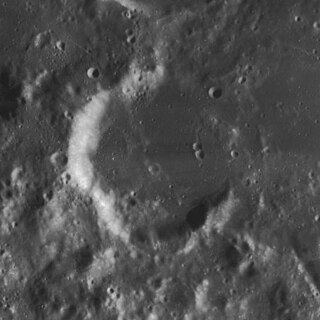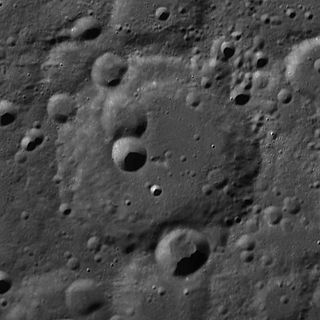
Egede is the remains of a lunar impact crater that has been flooded by lava, leaving only the somewhat polygonal circumference of the rim protruding just above the mare. It was named after Dano-Norwegian natural historian Hans Egede. It is located on the southern edge of the Mare Frigoris, to the west of the crater Aristoteles. To the southwest is an arc of low mountains curving between the rims of Aristoteles and Eudoxus. The floor of Egede is flat and nearly featureless, except for a few tiny craterlets, including secondaries from Aristoteles. The surviving rim has a maximum altitude of 0.4 km above the surface.

Lee is the lava-flooded remnant of a lunar impact crater that lies on an inlet of the Mare Humorum, in the southwestern part of the Moon. It was named after British astronomer John Lee. To the east is the crater Vitello, and just to the north is the lava-flooded crater Doppelmayer.

Agatharchides is a lunar impact crater located at the southern edge of Oceanus Procellarum, in the region between the Mare Humorum and Mare Nubium. To the east-southeast is the crater Bullialdus, and to the south-southwest lies Loewy. It is named after the Greek geographer Agatharchides.

Encke is a lunar impact crater that is located on the western edge of the Mare Insularum, to the south-southeast of the crater Kepler. The small crater Kunowsky lies to the east-southeast on the mare.

Goddard is a lunar impact crater that is located along the eastern limb of the Moon, and so is visible from the edge from Earth. It is best viewed during favorable librations when the orientation of the Moon brings it further into sight. The crater is located in the Mare Marginis, to the northeast of the prominent crater Neper. Ibn Yunus, a crater remnant, is attached to the southeastern rim and is partly overlaid by Goddard. To the northeast is Al-Biruni.

Fontenelle is a lunar impact crater that is located along the northern edge of Mare Frigoris, in the northern part of the Moon. To the northeast is the remnant of the crater Birmingham. Due to its location, this crater appears oval in shape when observed from the Earth because of foreshortening.

Bellinsgauzen is a lunar impact crater that lies in the southern part of Moon, on the far side from the Earth. It is attached to the northern rim of the larger crater Berlage, and within a half crater diameter of Cabannes to the west. North of Bellinsgauzen is the crater Bhabha.

Cremona is a lunar impact crater that is located along the north-northwestern limb of the Moon. From the Earth this crater is viewed from the side, and the visibility is affected by libration effects. To be viewed in any detail, this crater must be seen or photographed from orbit. It is located midway between the crater Boole to the south-southeast and, on the far side of the Moon, the crater Lindblad.

Isidorus is a lunar impact crater that is located to the north of the Mare Nectaris, on the eastern half of the Moon's near side. It was named after Spanish astronomer Saint Isidore of Seville. It forms a pair with the slightly larger Capella, which is attached to the east-northeastern rim. To the west-southwest across the lunar mare are Mädler and the prominent Theophilus.

Loewy is a small lunar impact crater that lies along the eastern rim of Mare Humorum, in the southwest part of the Moon's near side. It was named after French astronomer Maurice Loewy. This is a lava-flooded formation that lies to the southwest of the larger, lava-flooded crater Agatharchides. To the southeast is an even larger lava-flooded formation, Hippalus.

Dyson is a lunar impact crater, 63 kilometers in diameter, that lies on the far side of the Moon, past the northwest limb. It is located in the northern part of the surface, to the northwest of the crater Coulomb, and east of van't Hoff.

Petrov is an impact crater along the southeastern limb of the Moon. The crater is difficult to observe in this location, and visibility of this feature is affected by libration. The nearest crater of note is Chamberlin, just on the far side to the northeast. Somewhat farther to the west-southwest of Petrov is Gill.

Voskresenskiy is a lunar impact crater that is located near the western limb of the Moon. Due to its position, this crater is viewed edge-on, limiting the amount of detail that can be seen. The visibility of this formation is also affected by libration, so that this crater is sometimes hidden from sight, while at other times it can be more readily viewed.

Donner is a lunar impact crater on the far side of the Moon. It is located just to the northeast of the Mare Australe, behind the southeastern limb of the Moon. During favorable librations this part of the lunar surface can be brought into view of the Earth, but the site is viewed from the edge and so not much detail can be seen.

Edison is a lunar impact crater on the far side of the Moon. It is located just behind the north-northeastern limb of the Moon, a region that is sometimes brought into sight from Earth during favorable librations. However even at such times not much detail can be discerned, and the crater is better observed by orbiting spacecraft.

Erro is a lunar impact crater that lies beyond the eastern limb of the Moon, on the far side as seen from the Earth. It lies along the eastern fringes of the uneven plain that joins Mare Marginis to the northwest with Mare Smythii to the west-southwest. This part of the surface is sometimes brought into sight of observers on the Earth due to libration. However even at such times not much detail can be seen, as the surface is viewed from the edge.

Fridman is the remains of a lunar impact crater on the far side of the Moon. It lies due south of the huge walled plain Hertzsprung, and is attached to the northeastern rim of the crater Ioffe.

Houzeau is a lunar impact crater on the far side of the Moon. It is located to the northwest of the Mare Orientale impact basin, and ejecta from that event has fallen across this crater rim and its interior. To the south of Houzeau lies the crater Gerasimovich, and one crater diameter to the west is Belopol'skiy. To the northwest lies Fridman, with Ioffe to its southwest.

Jenner is a lunar crater that is located within the Mare Australe. It lies just past the southeastern limb, on the far side of the Moon, and can be viewed from the Earth during periods of favorable libration and lighting. Nearly attached to the eastern outer rim of Jenner is the larger, flooded crater Lamb.

Weber is a lunar impact crater on the far side of the Moon, and it cannot be viewed directly from the Earth's surface. This crater is attached to the northwest outer rim of the larger crater Sarton. About two crater diameters to the northwest is the eroded Kramers.

























